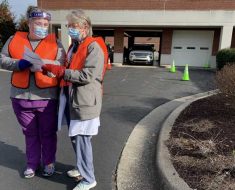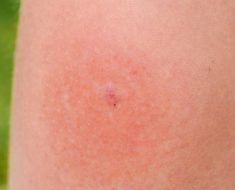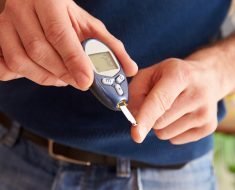A major heat wave is expected to spread across the US and is causing excessive heat advisories in 22 states. According to the Washington Post, 48 states are expecting temperatures of 95 degrees and above over the weekend. Most of us probably can’t hang out next to the AC all weekend, but there are still ways to stay safe in the sweltering weather.
How can extreme temperatures affect your body?
First off, it’s important to know how hot weather can impact your health. Heat exhaustion—or when your body overheats in high temperatures—can cause a myriad of uncomfortable symptoms, including nausea, dizziness, heavy sweating, and headaches. During heat exhaustion, your core body temperature remains below 104 degrees Fahrenheit, but your blood pressure will be lower and your heart won’t pump blood as efficiently.
“You’ll be very fatigued and sweating a lot and thirsty—so those natural defenses against heat and dehydration are still working,” Peter Shearer, MD, associate director of the Mount Sinai Hospital emergency department in New York City, previously told Health.
Heat exhaustion can lead to heat stroke, a more dangerous condition. Heat stroke occurs when your body’s core temperature rises above 104 degrees Fahrenheit, and it can cause damage to your brain, heart, liver, kidneys, spleen, and muscular tissue. Symptoms of a heat stroke include hot and dry skin, fast and strong pulse, headache, dizziness, nausea, confusion, and loss of consciousness.
“If it’s a person who is young and healthy and they’re really sweaty and thinking clearly, they will probably be fine after cooling down and resting,” Dr. Shearer said. “It’s really the people who are older or who have other medical problems—heart disease, diabetes—who you want to get to a hospital to be safe.”
How can you stay cool and avoid getting heat exhaustion?
There are a lot of ways to keep your body cool in the excessive heat. Dr. Shearer recommended limiting your time in the sun and drinking plenty of water—especially if you’re about to do physical activity. Additionally, wearing light, sweat-wicking clothes can prevent your body from overheating.
“If someone is overheating, you can loosen their clothing—make sure nothing’s too restrictive, or remove items they don’t need,” Shearer said. Using a fan, like the Honeywell HT-900 TurboForce Fan ($14, amazon.com) can also help lower a person’s body temperature.
After experiencing heat exhaustion, Shearer recommends taking it easy and avoiding physical activity. And we’re taking that advice, heat exhaustion or not.
To get the latest must-know health content delivered straight to your inbox, sign up for the Healthy Living newsletter
Source: Read Full Article





